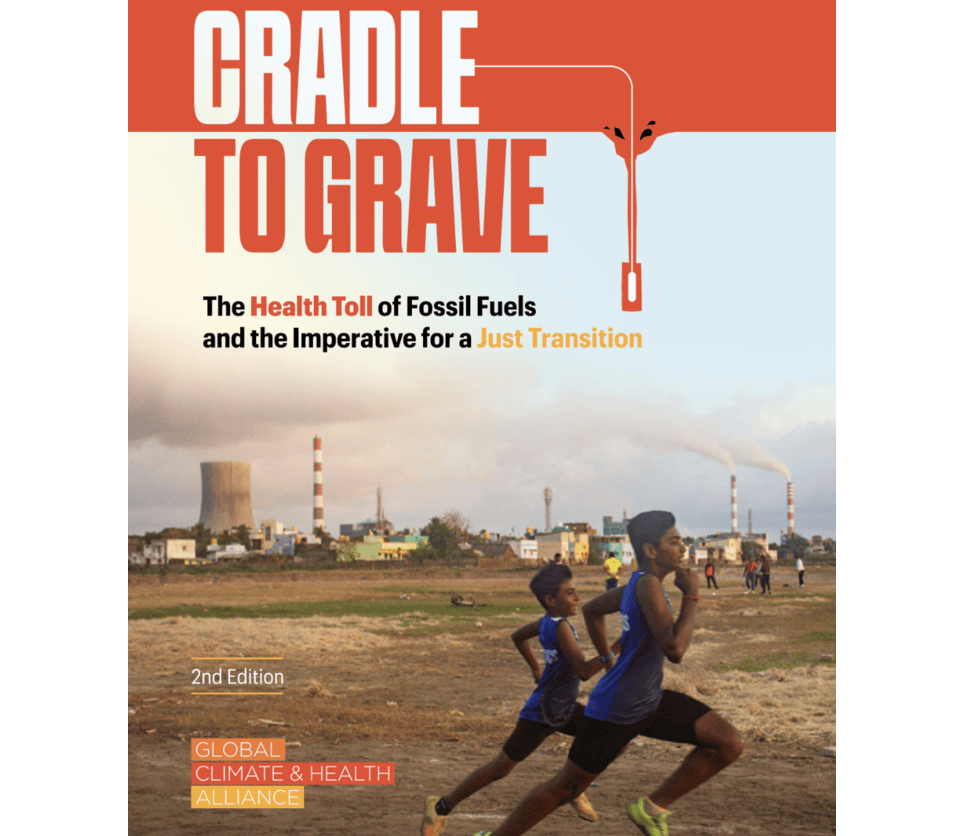Elevate research and evidence
Learn more about GCHA key areas of research and read our recent research reports on a range of climate, health and fossil fuel issues.
Photo: Pexels – Jens Mahnke
Whilst the connections between the health of people and our planet is becoming increasingly recognised, significant gaps between research and action still remain. GCHA works with our members and partners to identify and fill these gaps and produces reports, information sheets and other materials on the climate crisis, health and fossil fuels. See our ongoing and recent areas of focus below.
The health harms of fossil fuels: Collating the evidence
Most discussions about fossil fuels stop at the moment of combustion. The ‘Cradle to Grave: The Health Toll of Fossil Fuels and the Imperative for a Just Transition’ report (2025) takes a ground-breaking approach – mapping the entire fossil fuel lifecycle and exposing the health harms at every stage, from extraction to abandoned sites.
The 2025 report builds on the earlier 2022 report ‘Cradle to grave: The health harms of fossil fuel dependence and the case for a just phase-out’ which examined the impact of fossil fuel extraction, production and combustion on human health, the role subsidies play as supporting fiscal architecture for fossil fuel dependence, and solutions to achieve fossil fuel phase-out across sectors.

Methane and health
Methane is a short-lived, powerful greenhouse gas (GHG) that is accelerating global warming and contaminating the air, water, and soil humans depend on. It is about 80 times more powerful than CO2 as a GHG in a 20 year period and has caused more than 30% of current global warming so far. Methane affects human health in many ways, and seizing the opportunity to reduce methane emissions is not only a pivotal step for the health of the planet, but also for the well-being of people.
In 2023 GCHA and partners produced a series of reports, events and videos in multiple languages on the links between methane and health including reports on:
- Mitigating Methane: A Global Health Strategy Overview
- Mitigating Methane from Food and Agriculture
- Mitigating Methane from the Energy Sector
- Mitigating Methane from the Waste Sector
Learn more about our research on Methane and Health and download GCHA reports below.
Wildfires and the emerging threat of smoke impacts on health
2021 report
During the 2019 fires in the Amazon rainforest, GCHA noted that there was scant discussion about the health impacts of the smoke from the fires, and little publicly available data. Therefore in 2021, GCHA in collaboration with the Climate and Health Alliance in Australia, the Canadian Association of Physicians for the Environment in Canada, and the WONCA Working Party for the Environment, whose chair is based in Brazil, produced a report ‘The Limits of Livability: The emerging threat of smoke impacts on health from forest fires and climate change’.
The report looks at the health impacts of forest fire smoke, with case studies of major recent fires in each country and interviews with in-country researchers, experts, and medical professionals. A number of recommendations emerge for ways to better prepare for and respond to the health threat of wildfire smoke.
The 2021 report is available in Portuguese, Spanish and English and country briefs for Australia, Brazil and Canada are also available.
2024 report
In November 2024, the Latin American and Caribbean Climate and Health Network (La Red de Clima y Salud de América Latina y el Caribe) produced a report in Spanish and Portuguese on ‘Wildfires, Climate Change and Health’. The report highlights that Latin America is facing a growing public health crisis fuelled by the synergistic forces of fires and anthropogenic climate change.
Learn more about our research on the emerging threat of smoke impacts on health from forest fires and climate change, and download reports below.
